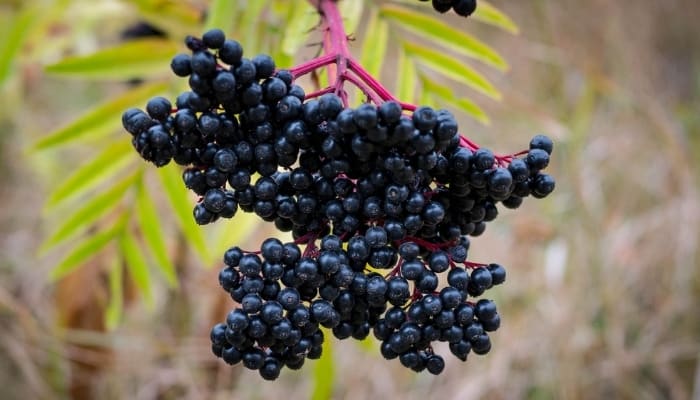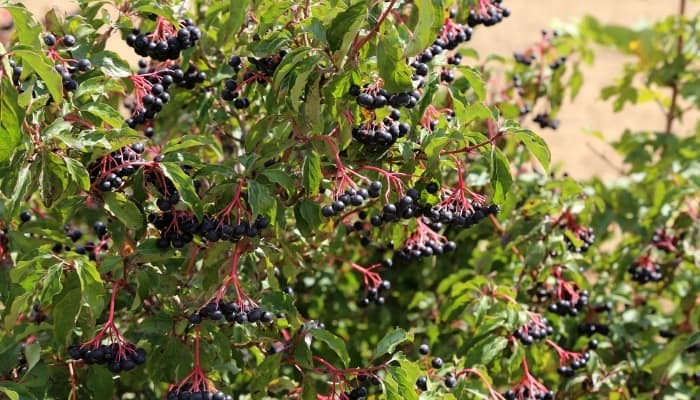The elderberry plant, with its white flowers and vibrant blue-purple fruits, is a visually pleasing sight.
Its good looks and medicinal properties made it the favorite plant for cultures as diverse as the Ancient Egyptians and Medieval Europe.
What are the pros and cons of growing elderberry? Growing elderberry is rewarding due to the lush green leaves, white flowers, and delicious and healthy blue-purple, black, or red fruits. However, the plant can be toxic as it contains trace amounts of lectins and cyanogenic glycosides that could release cyanide.
The relationship between humans and the elderberry is complicated.
There’s a tradeoff between the ornamental plant with delicious fruits and the side effects of consuming the uncooked fruits that can be quite serious.
Read more to find out the pros and cons of growing elderberry.
Pros and Cons of Growing Elderberry
Some plants are easy to grow, reward you for your hard work, and barely have any downside. Elderberry is not one of those plants.
Despite its many benefits, its toxicity is one of the main issues that keep many people from enjoying it.
Advantages of Growing Elderberry
When you grow elderberry, you’ll be surprised at how fast it takes. The plant doesn’t require much more than plenty of nitrogen in the soil.
Besides that, it really takes care of itself. This is why you’ll find it growing near organic waste dumps. It thrives on nitrogen.
It also has supple branches that are easy to bend and shape. This makes it ideal for hedges.
Add to that the large, lush green leaves that can reach 12 inches in length, the clusters of exquisite white flowers, and the blue-purple fruits bursting with flavors and sweetness.
Elderberry is an ornamental plant of the first rate.
Cons of Growing Elderberry
For all its ornamental values, elderberry can be a problematic plant. It attracts all kinds of wildlife, insects, and larvae.
It’s the favorite food for band-tailed pigeons. Larvae of dot, brown-tail, and emperor moth make the plant their home where they feed on the leaves.
Longhorn beetles and other insects lay their eggs on the bark of the elderberry bushes and become a nuisance.
There’s also a problem with the crushed branches, leaves, and unripe fruits. They release a fetid smell that lingers in the air for hours.
Additionally, the plant grows fast, so regular pruning is a must in order to keep it in shape.
Pros and Cons of Taking Elderberry
Elderberry Benefits List
The elderberry fruit is rich in vitamins, minerals, and dietary fiber. Here are some of the benefits of consuming this delicious fruit and tinctures made from the berries.
- Nutrient rich: The elderberry fruit contains high concentrations of vitamin C, dietary fiber, phenolic acids, flavonols, and anthocyanins.
- Fights cold and flu: Elderberry extracts help with the symptoms of cold and flu. Both vitamin C and the antioxidants in the fruit help the immune system fight off the flu virus.
- Rich in antioxidants: Antioxidants are known to prevent cardiovascular diseases as they bind to the free radicals in the bloodstream and prevent them from clogging the blood vessels.
- Bolsters the immune system: The micronutrients found in the elderberry improve the production of white blood cells that attack pathogens in the body.
- Protects against UV radiation: Extracts from the elderberry plant proved to be effective in protecting the skin against the damage of UV radiation to the skin cells.
Drawbacks To Taking Elderberry
When consuming elderberry, you should make sure that the fruits are ripe and cooked. Unripe and undercooked fruits can cause stomach pain and in some cases cyanide poisoning.
You should avoid touching any part of the plant with your bare hands since the bark, stems, and leaves are also toxic.
Keep your pets and livestock away from the elderberry bush. Although the risk is minimal, if a dog or cat chews on the leaves or other parts of the plant, they could develop cyanide poisoning.

Elderberry Side Effects
The side effects of elderberry consumption include the following:
- Stomachache and diarrhea as a result of lectin in the unripe fruits, bark, and leaves.
- Drinking the juice of some fresh elderberry species could lead to nausea and vomiting.
- Children and teens under 18 as well as lactating women shouldn’t take elderberry in any form for fear of cyanide poisoning.
- Diarrhea is a common side effect of consuming elderberry fruits in large quantities.
Elderberry Benefits for Skin
Ancient Egyptians used elderberry fruits, not as a source of food, but to treat burns and improve their complexions.
They made a paste out of the ripe fruits and treated burns, blemishes, acne, and other skin diseases.
These days, elderberry extracts are used as sunblock to protect the skin against UV rays that damage the skin cells and cause cancer.
Common Questions About Taking Elderberry
Who Should Not Take Elderberry?
For the most part, children, adolescents under 18, and lactating women shouldn’t take elderberries in any form.
Moreover, any product with elderberry extracts in it can cause severe side effects in these demographics.
Can You Take Elderberry Daily?
It’s not recommended to take elderberry on a daily basis. This includes both the fruits that have to be cooked in advance as well as any products based on the plant.
Although the plant contains small amounts of cyanogenic glycosides and lectins, daily consumption could lead to a buildup of toxins, such as cyanide in the liver, which would lead to health complications.
If you’re taking elderberry as a food supplement, ask your doctor about the best dosage and whether you should take it daily.
Is Elderberry Good for the Immune System?
Elderberry contains micronutrients that trigger the immune system to produce more white blood cells. These are the cells that attack parasites, bacteria, and viruses that make their way into the bloodstream.
So taking elderberries might boost your immune system, but the fruit has many side effects. If you have a weak immune system, you should consult your physician before taking elderberry.
Does Elderberry Raise Blood Pressure?
Studies on rats proved that elderberry extract reduced blood pressure. There were no studies on humans, however, so it’s not clear if elderberry fruits and extracts have any effect on the blood pressure in people.
Does Elderberry Interact With Medications?
There is no conclusive evidence that proves that elderberry or any of its extracts interact with medications of any type.
Still, to be on the safe side, you should talk to your doctor before going on a regimen of elderberry supplements.
Can You Take a Multivitamin and Elderberry Together?
The elderberry fruit is packed with vitamins and micronutrients that benefit the body in different ways. So taking elderberry supplements with multivitamins should be okay since elderberries don’t interact with medications or other supplements.
That said, you should be wary of overdosing on vitamin C, which is abundant in elderberry. Symptoms include nausea, diarrhea, and vomiting.
Conclusion
The elderberry plant is a perfect hedge plant since it takes quickly and grows at a fast rate, earning it the nickname, instant hedge.
It has lush green foliage and clusters of white flowers and black fruits, but the plant also attracts pests and wildlife.

